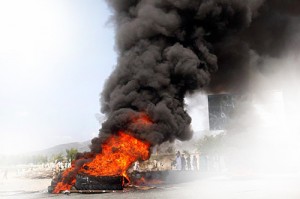Last Saturday was a solemn day of reflection and observance for the ninth anniversary of the Sept. 11, 2001 terrorist attacks.
But for some Americans, the anniversary of this infamous day is a time to call for restoration of American ideals.
On Sunday, Sept. 12, hundreds of Muslims, Christians, Jews, Buddhist, Hindus and secular humanists congregated in the backyard of the George Eastman House to make a stand against the rising tension and negative attitudes toward Muslim-Americans.
The event, orchestrated by the Interfaith Alliance of Rochester, charged attendees not to sit back when there are injustices, but to speak up and take initiative.
UR’s Director of the Interfaith Chapel Allison Stokes and Chaplin for the Muslim Students’ Association Rashid Muhammad also showed up to show support for the Interfaith Alliance.
Former Rochester mayor William Johnson headlined the gathering, weighing in on the anti-Muslim epithets that have been seemingly galvanized with the proposed Islamic cultural center in Lower Manhattan, Park 51.
Johnson also lamented that factors, such as Barack Obama’s name and the idea of him being Muslim, have been perverted from symbols of Americanism and its praiseworthy diversity, to instruments of fear and unfounded paranoia.
He went on to accuse certain conservative news outlets for politicizing the issue for this year’s elections with reckless regard for the divisiveness that their sentiments evoked.
But he encouraged attendees to go above and beyond avoiding those who disagree and instead to actively take on injustices.
“I challenge you to leave here today, committed to do something for the good side and not to rest until we’ve won,” Johnson said. “Small, scattered gatherings like these aren’t good enough. Simply switching your channel from Fox to NBC won’t fix anything.”
Prior to the Interfaith Alliance’s decision to schedule the event for Sept. 12, Christian extremist Pastor Terry Jones threatened to host “Burn a Quran Day” at his Florida Church on the ninth anniversary of Sept. 11.
His radical response to the planned 13-story Islamic center in Lower Manhattan quickly gained national attention.
But after several warnings and pressure from the U.S. government to call off the inferno because of the eminent security threat it posed for U.S. troops in the Middle East, including statements from Barack Obama and top U.S. Commander in Afghanistan General David Petraeus, Jones agreed never to have or encourage a “Burn a Quran Day” again.
Although Jones’s ploy is possibly the greatest ripple effect from the proposed Islamic cultural center, it certainly is not an anomaly.
Three weeks ago, 21-year-old New York City film student Michael Enright slashed 43-year-old yellow taxi driver Ahmed Sharif across his neck, face and shoulders after asking him whether or not he was Muslim.
And on a more local level, in Orleans County, which is just north of Rochester, three 18-year-olds and two 17-year-olds interrupted an Islamic worship service by driving by and shouting obscenities and honking their horns outside the mosque.
One of the teens was accused of firing a shotgun while another even sideswiped one of the worshippers with his car as he was leaving the World Sufi Foundation Mosque, the only mosque in the entire county.
Prosecutors are still holding off on charging the teens with a hate crime, allegedly at the request of the mosque’s congregators.
The surge in xenophobia and Islamaphobia prompted Professor Nora Rubel, who specializes in Jewish studies, and Professor Emil Homerin, who specializes in Middle Eastern and Islamic studies, to address the issue on Bob Smith’s WXXI talk radio show. All parties seemed to agree that what has stemmed from a political tactic for the upcoming elections has now tapped into an area of discomfort for Americans who are nervous about integrating Islamic culture into their idea of America.
“I think that one of the things that is happening is there’s a lot of anxiety over what it means to be an American,” Rubel told Smith. “Every generation has to decide what is America, and this idea of Muslims becoming a part of the American fabric leaves some people feeling like they are becoming less of the dominant culture, and this makes people nervous.”
Despite the wide range of opinions throughout the nation, President of Students for Interfaith Action and senior Naomi Ahsan says that she is thankful that the UR community has generally been accepting and safe for all cultures. Ahsan noted that the success of the Muslim Students’ Association’s Pakistani flood relief drive proved just that.
“I don’t perceive anything akin to Islamophobia on our campus,” Ahsan said. “The 20 million people affected by monsoon floods in Pakistan are mostly Muslim, and MSA has raised over $3,000 on this campus to send as aid. Given the options, most students chose to send their money through Islamic Relief rather than UNICEF.”
However, Ahsan says that it is still important to engage the UR community about the issue. Even if the River Campus is a safe haven, she noted that it’s imperative to take into account the myriad of communities that students go home to when school is out.
“Even if UR feels safe and welcoming to people of different backgrounds and affiliations, every student here identifies with other communities outside our campus bubble,” she said. “We all go home to different parts of the country, and this country is less safe if a New York taxi driver can get stabbed for being Muslim, a man can be intentionally hit with a car outside a mosque in Holly, N.Y., and a future mosque site in Murfeesboro, Tenn. can get set on fire.”
While there are mixed opinions on both sides of the discussion, Ahsan and others have at least found comfort that an overdue dialogue is in motion.
Nathaniel is a member of the class of 2011.


